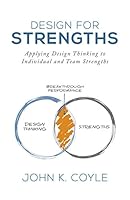# Design for Strengths

## Metadata
- Author: [[John K. Coyle, Steven Kotler, Daniel Coyle, David Kelley, Tom Kelley, David Eagleman, Chip Conley, M...]]
- Full Title: Design for Strengths
- Category: #books
## Highlights
- Johnkcoyle.com/strengths-book-freebies ([Location 223](https://readwise.io/to_kindle?action=open&asin=B07BDQWRDV&location=223))
### FAILURES AND TURNING POINTS
- “The fact is that negative events do affect us, but they generally don’t affect us as much or for as long as we expect them to. When people are asked to predict how they’ll feel if they lose a job or a romantic partner … if they flub an interview, flunk an exam, or fail a contest, they consistently overestimate how awful they’ll feel and how long they’ll feel awful.” ([Location 246](https://readwise.io/to_kindle?action=open&asin=B07BDQWRDV&location=246))
- “If you’re really going to do this, you are going to have to learn to become obsessed with the process, not the outcome.” ([Location 273](https://readwise.io/to_kindle?action=open&asin=B07BDQWRDV&location=273))
- Tags: [[favorite]]
### DESIGN THINKING 101: WHAT IS IT?
- Prior to the start of most of my Product Design classes there was an opportunity to participate in “imaginariums”—part relaxation, part meditation, part visualization. ([Location 347](https://readwise.io/to_kindle?action=open&asin=B07BDQWRDV&location=347))
- First, they were incredibly driven to solve “human centered” design problems; they were insatiable and emotionally motivated to “find a way.” When it came to how to solve the problem or the potential solutions, however, they were amazingly dispassionate, completely “solution agnostic.” This paradox, as I learned, is the core of the “Designer’s Mindset.” ([Location 371](https://readwise.io/to_kindle?action=open&asin=B07BDQWRDV&location=371))
- Tags: [[favorite]]
- Note: Fall in love with he problem, not the solution.
- The basic steps of the Design Thinking process followed in this book—all are both flexible and iterative—are as follows, Accept, 2) Define, 3) Empathize, 4) Ideate, 5) Prototype, and 6) Test. ([Location 393](https://readwise.io/to_kindle?action=open&asin=B07BDQWRDV&location=393))
- Tags: [[favorite]]
- Kelley is the founder and chairman of IDEO, a professor at Stanford University, and founder of its Hasso Plattner Institute of Design (known as the d.school). ([Location 405](https://readwise.io/to_kindle?action=open&asin=B07BDQWRDV&location=405))
- Note: Agencia negocio, da clases en universidad reconocida y tiene su propia escuela de diseño. Tal como Don Norman.
- The define stage is all about framing and reframing the problem in meaningful and solvable ways. ([Location 445](https://readwise.io/to_kindle?action=open&asin=B07BDQWRDV&location=445))
- Occam’s Razor: “Other things being equal, simpler explanations are generally better than more complex ones.” ([Location 446](https://readwise.io/to_kindle?action=open&asin=B07BDQWRDV&location=446))
- Maslow’s Hammer: “If all you have is a hammer, everything looks like a nail.” ([Location 447](https://readwise.io/to_kindle?action=open&asin=B07BDQWRDV&location=447))
- Empathy doesn’t mean sympathy or agreeing with a particular viewpoint. Empathy means being able to shift your own thinking to emulate the thought patterns of someone else, to understand why something can make sense to someone possessing a particular mindset in a particular context. ([Location 453](https://readwise.io/to_kindle?action=open&asin=B07BDQWRDV&location=453))
- Tags: [[favorite]]
- Brain science teaches us that generating ideas— divergence—is a discrete function from the evaluation or judgment of those same ideas. ([Location 458](https://readwise.io/to_kindle?action=open&asin=B07BDQWRDV&location=458))
- In this phase, you take a prototype—a new way of doing something—and try it in “real life.” ([Location 470](https://readwise.io/to_kindle?action=open&asin=B07BDQWRDV&location=470))
- While I believe fixing weaknesses is a meaningful and essential challenge for children, this same challenge for adults becomes a “gravity problem,” an unsolvable waste of energy. ([Location 486](https://readwise.io/to_kindle?action=open&asin=B07BDQWRDV&location=486))
### UNWINDING THE WEAKNESS-FOCUSED FLYTRAP
- When you achieve some level of excellence—in sports, academics, music, or any endeavor—people will sometimes ask, “What is the secret to your success?” The easy answers are those platitudes shilled at us repeatedly as children, “Never give up … Never give in … Never quit … Good things come to those who wait … Quitters never prosper.” ([Location 525](https://readwise.io/to_kindle?action=open&asin=B07BDQWRDV&location=525))
- Persistence is awesome, until it is stupid. So why do we persist in chasing weaknesses? ([Location 533](https://readwise.io/to_kindle?action=open&asin=B07BDQWRDV&location=533))
#### Weakness Focus: A Collective Adult Neurosis
- A propensity to quit too early means a life, and a set of capabilities, unexplored. Quitting too early leads to a life of superficial scratching at our human capacities. Quitting too early is a near and present danger for every child, as nearly every parent can attest. ([Location 549](https://readwise.io/to_kindle?action=open&asin=B07BDQWRDV&location=549))
#### The Antecedents of a Weakness-Focused Culture: Marshmallows
- In almost every way, the ability to persevere through short-term suffering in service of long-term rewards has led to long-term success. ([Location 557](https://readwise.io/to_kindle?action=open&asin=B07BDQWRDV&location=557))
- If you are over age 25 and still trying to fix your weaknesses, that ship has sailed! ([Location 575](https://readwise.io/to_kindle?action=open&asin=B07BDQWRDV&location=575))
#### The Fallacy of Fixing Flaws: Freak Factor Author Dr. David Rendall
##### How Dyslexia Helped Me Win a Gold Medal: Meryl Davis
#### The Advice of a Master-Coach: “Race Your Strengths”
- “Race your strengths! Race your strengths! Train your weaknesses!” and “Racing is the best training!” ([Location 627](https://readwise.io/to_kindle?action=open&asin=B07BDQWRDV&location=627))
### STRENGTHS, DELIBERATE PRACTICE AND FLOW: ARE STRENGTHS EVEN REAL?
- In the “strengths” camp are the popular business books, Now, Discover Your Strengths by Marcus Buckingham and Donald Clifton and Strengths Finder 2.0 by Tom Rath. ([Location 660](https://readwise.io/to_kindle?action=open&asin=B07BDQWRDV&location=660))
- In the “deliberate practice” camp, we have Talent is Overrated by Geoff Colvin, Peak by Anders Ericsson, and The Talent Code by Daniel Coyle. Malcolm Gladwell also entered the fray with his classic book, Outliers. ([Location 661](https://readwise.io/to_kindle?action=open&asin=B07BDQWRDV&location=661))